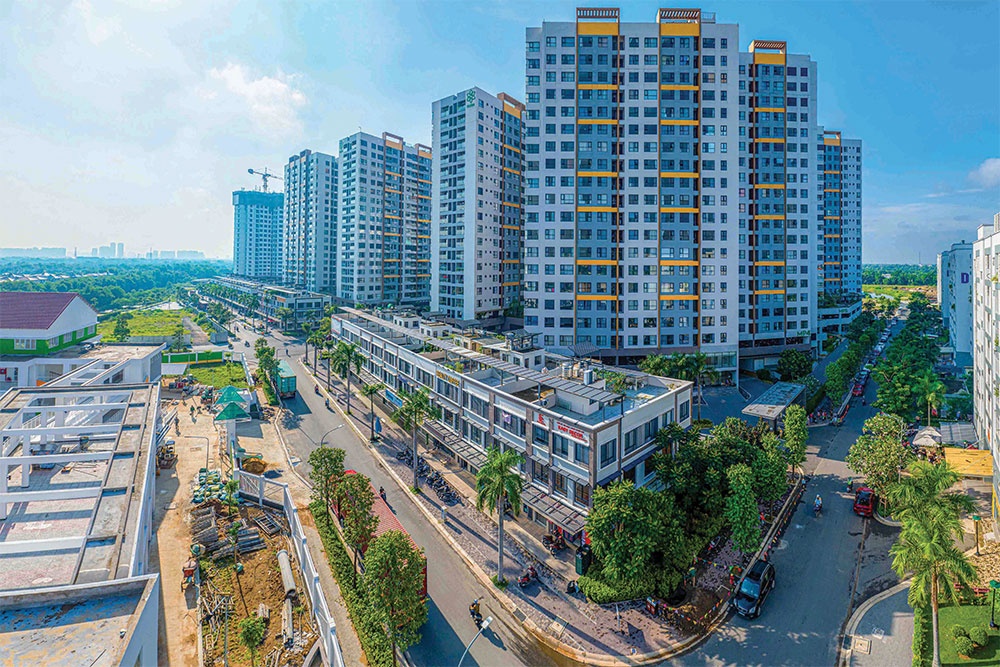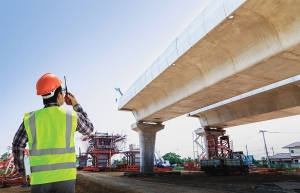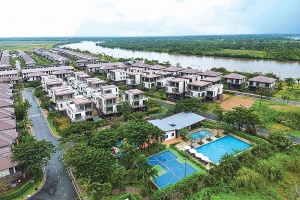How predictable can 2023 become for real estate?
 |
| Nguyen Hoang Nam-General director, G-Homes |
As a player in the sector for more than two decades, I and many other business leaders don’t expect a dim outlook for the real estate market at this time. In terms of the macroeconomic factors, Vietnam still posts a good GDP growth, increased public investment disbursement while maintaining inflation at an acceptable level. When there is a huge demand for housing, why people are so pessimistic about the scenario of the market?
From the perspective of business leaders, I have to agree with this point of view. If I disagree and dream too much about the prospect that the market will still be good, I will lose liquidity and have no money to pay my staff, who are working day and night to seek customers to get 2-3 per cent commission for each transaction.
I also play a role as a market analyst who has made contributions and shared ideas to improve the real estate market. From the perspective of market analyst, I feel sad about the things I want to do, but which don’t happen. When the market grows too drastically, it leads to unsustainable development.
Data from market research companies show that there is a widespread decline in liquidity across all segments due to the exponentially rising housing prices, which are out of control. Meanwhile, homebuyers with genuine demand tend to delay the purchase due to uncertainty. It is worth noting that many people expect that housing prices will reach the bottom level amid the volatility.
This has caused many troubles for real estate brokers, whose income mainly from the 2-3 per cent commission fees depending on the price of each apartment and land plot. The shrinking housing prices mean reduced income for the brokers.
Meanwhile, the marketing and sales expenses remain the same. With a low and slow liquidity, investors have to give priority the development costs so that it is easy to delay the payment of commissions to sales agencies.
The outbreak of the pandemic dampened the outlook for real estate brokers. However, when it was contained at the end of last year with widespread vaccination, brokers expected a new cycle for the real estate market. However, the credit tightening policy and the problems in the corporate bond market have once again frustrated brokerage businesses when investors turned their back to the market.
It is a challenge for us all. The real estate crisis in the 2009-2011 period seems to be back again with many uncertain factors, although the current market context is far different from the previous period.
The market uncertainty has affected the transactions across a wide range of assets, including land-based property, luxury and ultra-luxury apartments although the majority of buyers in the segments can afford them.
Meanwhile, the lucrative hospitality segment has witnessed the strong recovery post-pandemic, but the market has been subdued.
Real estate developers are suffering tremendous pressure to control the cash flow for this capital and expense-intensive segment. For instance, steel prices have been increased by 46 per cent on-year, which results in an average increase of 7 per cent for the project development expenses. The pressure also comes from the increase in land development costs and bank loan interests.
 |
| The market fluctuates based on the law of supply and demand rather than subjective will |
Non-market perspectives
I recently heard some people say that real estate businesses should lower their prices – that if real estate companies want to save themselves and the market, they must lower real estate prices to their true value.
The viewpoints seem logical for the majority. However, this is a non-market perspective. Vietnam’s real estate market doesn’t fare well because of this mindset.
Commodity prices are determined by supply and demand. The price has reached a point where supply and demand are equal. The highest price that the buyers can accept is equal to the benefits they receive.
The price the sellers accept must be at least equal to the actual expenses and earned profit. The price should account for the possibility of a loss reduction.
To their advantage, property owners (both large and small) know best when to sell their property and for how much. They do not need anyone’s advice, especially to reduce or increase the price of products. When supply exceeds demand and there are no buyers in the real estate market, the price will fall.
There is a paradox: supply is exceeding demand, but there has yet to be any solution to this challenge. The middle- and high-end developers have provided excess supply, while there is a lack of affordable housing for low-income buyers. Developers find it hard to develop affordable housing, as defined by many experts, due to the large expenses from administrative procedures to land prices.
However, most developers don’t raise their voice about the policy of developing affordable housing for low-income people, simply because input and output costs cannot be balanced. In fact, if businesses want, they can join forces to develop this product line.
However, it is really difficult for businesses, and most of them are not keen on it due to the high risks. This is especially true in the context of an increasing number of volatile factors such as inflation and interest rate hikes.
There are some incentives, like a 50 per cent tax cut. However, buyers directly benefit from this policy rather than developers. According to the regulation, this incentive is not covered in selling prices. Most developers have found their ways to enjoy this incentive.
It can be seen that the government should not call on businesses to reduce prices. Instead, the government should create the mechanism to promote the smooth operation of the market in line with three groups of solutions: transparent information, consistent policies, and information and knowledge channels for buyers.
As a result, buyers can have sufficient information and the ability to analyse and make necessary judgments. The government should have mechanisms for screening and allocating capital so that resources can be concentrated on the finished product and each specific product group.
In fact, the Ministry of Construction has to admit that the incentive policies are not attractive enough for developers to build social housing and worker housing projects. The profit of the entire project cannot exceed 10 per cent of the total investment costs. The social housing projects are exempt from the land-use levy, but the developers have to carry out the procedures for calculating the land-use fee for exemption.
Developers have to lease 20 per cent of the total area for a minimum of five years before it can be sold. Thus, they cannot get the capital during this time. All of these requirements make businesses feel frustrated when doing social housing projects.
Furthermore, many business leaders shared that social housing projects are built with non-budget capital. Before making any sales or leases, they have to identify the prices to get approval from the state agencies. This is a lengthy and costly process for businesses.
On the other hand, excessive control over construction costs for social housing will lead to a downgrading of the quality of the projects. This may have great consequences in the future for urban aesthetics, as has already happened with other resettlement buildings.
No country, including those with a much higher level of development than ours, asserts that its real estate policy is impeccable. Recession cycles are an inevitable trend. The Vietnamese market is still in its infancy, so it is necessary to have a synchronous amendment of relevant laws such as those on land, real estate business, and housing. This will help promote the development of the real estate market in a smoother and healthier manner, contributing to the growth of the country.
However, I expect there will be a breakthrough in the framework so that the market has a better legal foundation. Homebuyers with real needs and long-term investors will have the opportunity to purchase and own their properties.
 | Identifying genuine hotspots Transport infrastructure with regional connectivity will be accelerated in 2023, which is expected to boost the coastal real estate market and open breakthrough opportunities. |
 | Suburban real estate market awaits fresh investment wave A cold spell is flowing into investment hotbeds in the environs, making many investors disillusioned. Golden opportunities still persist, however, as the market attempts to usher in a new development circle buoyed by constantly improved infrastructure. |
 | The promising land of Dong Nai The progress of key infrastructure projects has been fast-tracked to create a driving force for the vibrancy of the real estate market in the southern province of Dong Nai, attracting a significant number of real estate developers and investors. |
 | Potentialities in the land of nine dragons With land in Ho Chi Minh City limited and the southeast provinces densely populated with projects, developers are beginning to settle in the Mekong Delta. |
What the stars mean:
★ Poor ★ ★ Promising ★★★ Good ★★★★ Very good ★★★★★ Exceptional
Related Contents
Latest News
More News
- Saigon Centre gains LEED platinum and gold certifications (February 12, 2026 | 16:37)
- Construction firms poised for growth on public investment and capital market support (February 11, 2026 | 11:38)
- Mitsubishi acquires Thuan An 1 residential development from PDR (February 09, 2026 | 08:00)
- Frasers Property and GELEX Infrastructure propose new joint venture (February 07, 2026 | 15:00)
- Sun Group led consortium selected as investor for new urban area (February 06, 2026 | 15:20)
- Vietnam breaks into Top 10 countries and regions for LEED outside the US (February 05, 2026 | 17:56)
- Fairmont opens first Vietnam property in Hanoi (February 04, 2026 | 16:09)
- Real estate investment trusts pivotal for long-term success (February 02, 2026 | 11:09)
- Dong Nai experiences shifting expectations and new industrial cycle (January 28, 2026 | 09:00)
- An Phat 5 Industrial Park targets ESG-driven investors in Hai Phong (January 26, 2026 | 08:30)

 Tag:
Tag:



















 Mobile Version
Mobile Version